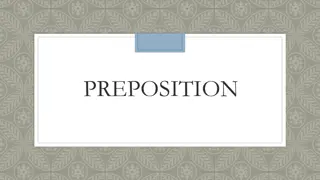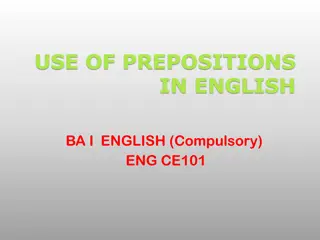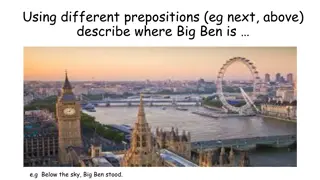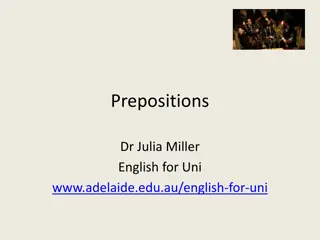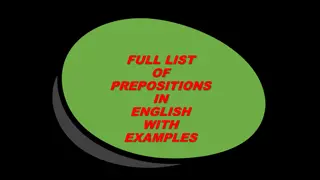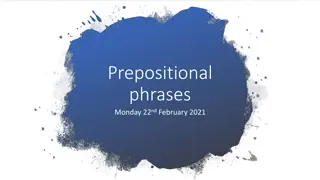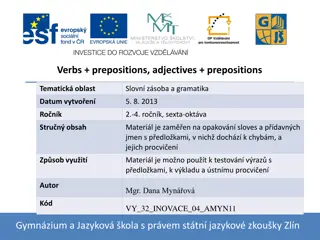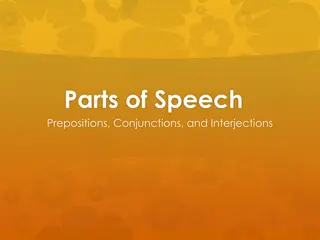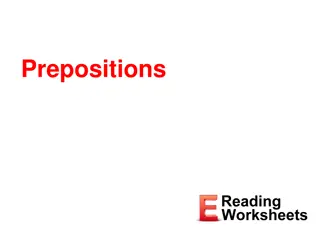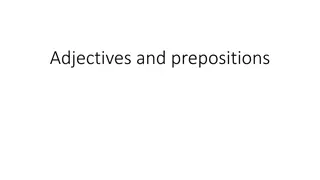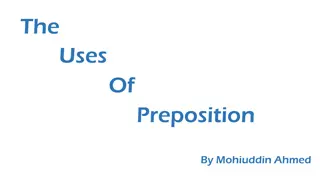Understanding Prepositions in English
Prepositions are essential in showing relationships between nouns or pronouns and other words in a sentence. This guide explains commonly used prepositions such as 'After,' 'Before,' 'At,' 'On,' 'Until,' 'By,' 'For,' 'During,' 'From,' 'In,' and 'Since' with examples for each. Enhance your knowledge of prepositions to improve your English language skills.
Download Presentation

Please find below an Image/Link to download the presentation.
The content on the website is provided AS IS for your information and personal use only. It may not be sold, licensed, or shared on other websites without obtaining consent from the author. Download presentation by click this link. If you encounter any issues during the download, it is possible that the publisher has removed the file from their server.
E N D
Presentation Transcript
Prepositions: are words which show the relationship between a noun or a pronoun object and some other words in the sentence. They are always followed by nouns or pronouns.
1.Preposition of time - After - Before - At - On - Until - By - For - During - From - In - Since
After After is used for something that occurs after a certain time. - I ll see you AFTER class. - AFTER the party , we went home. - She came in right AFTER she finished work.
Before Before is used for something that occurs before a certain time. - We must finish BEFORE 5:00. - BEFORE going to school I didn t know how to calculate. - Where did you live BEFORE coming here?
At At is used with times. - We have to hand in the project AT noon. - John wakes up AT 5:00 AM. - My date is AT 8:00 . - Come to my place AT six to play some basketball.
In In is used for long periods of time. - I learned how to drive IN 5 weeks. - Jack will be back IN 10 hours. - Cars were created IN the 17th century.
For For + a period of time expressing duration. - I have been in this town for six years. - It was in the cellar for 5 days. - He has been waiting for hours.
Until Until is used to say how long something continues. - I will stay here until you come back - Everything was good until we left the office. - Until you start cleaning your room, no TV.
On On is used with dates and days. - I will see you on Monday! - The exam will be on the 5th of February. - She got many gifts on Christmas.
During During is used to say when something happens. - I slept DURING the movie. - We met a lot of people DURING the trip. - He kept snoring DURING the night.
Since Since is used for a starting time, a specific time. - It s been raining SINCE yesterday. - He started studying SINCE 1999. - SINCE he was born he hated his uncle.
At At In In until until on on 1. 2. Jane is arriving ___ January 26 ___ 2 o'clock in the afternoon. It snows here every year ___ December. We always go outside and play in the snow___ Christmas day. Michael is leaving ___ Friday ___ noon. Frankie started working for her law firm ___ 1995. Normally,___ New Year's Eve, it's tradition to kiss the one you love ___ midnight. Don't be ridiculous; there were no telephones ____ the seventeenth century ! The telephone was invented ____ the 1870s. The plane leaves tomorrow morning ___ 8:00 AM. The hills here are covered with wildflowers ___ early spring. We met at the restaurant ___ 6:30 and stayed ___ 10:30. 3. 4. 5. 6. 7. 8. 9.
Before Before - - After After 1. You will not be hungry _____ you eat. 2. You have to pack your suitcase _____ you go to the airport. 3. ____ he started the car, the engine made a strange sound. 4. Every night ______ I go to bed, I brush my teeth. 5. _____ the girl fell asleep, she had a strange dream. 6. David got promoted _______ just two years with the company. 7. ______ my mother comes to visit, I usually clean my house.
During During For For Since Since 1. Nobody spoke _____ the presentation. 2. Simon has been sleeping _____ 8 hours. 3. We waited _____ 30 minutes outside your house. 4. I haven t seen him ______ 2005. 5. We get plenty of snow here _____ the winter. 6. He has been absent ______Tuesday



